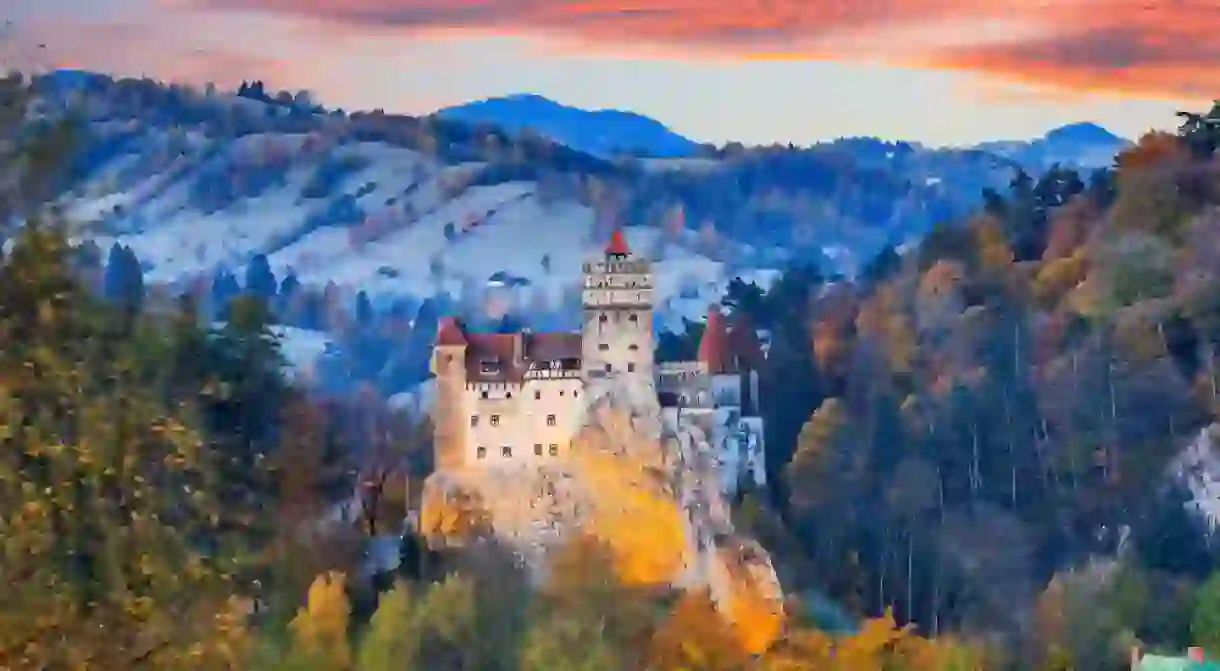13 Most Beautiful Natural Landscapes in Romania

From the emerald green waters of the Danube, to the more than a dozen mountain peaks over 2,500 meters tall, via the spectacular mud volcanoes, underground salt mines and the Black Sea shore, and back to the endless maze of canals of the Danube Delta, the variety of Romania’s natural landscapes is astonishing. Check out our pick of the most beautiful.
>> Check out our favourite tours and experiences in Romania
Cazanele Dunării
The Danube enters Romania in Baziaș, southwestern Romania, and runs along the country’s southern border for 1,075 kilometres until it reaches the Black Sea. On its way it ripples through beautiful hills, creating one of the most spectacular natural landscapes in the country. Also here, carved in a mountain wall is the tallest rock relief in Europe, depicting Decebalus, the Dacian King, an important figure in Romanian history.

Făgăraș Mountains
The tallest – peaking at 2,544 meters – and, according to some, most picturesque mountain range in the Carpathians, Făgăraș Mountains are a very popular destination year-round for hiking and skiing. Dotted with glacial lakes, the largest being Bâlea Lake, which is found at an altitude of 2,040 ft, it is also one Romania’s most photogenic mountain ranges.

Transfăgărășan
Driving along the Transfăgărășan, dubbed ‘the best road in the world’ by former Top Gear presenter Jeremy Clarkson, can be the experience of a lifetime. The views you get at 2,040 meters up are impressive, as is the fresh air and the surrounding rich, pristine nature. Built in only four years in the 1970s by Romania’s communist ruler Nicolae Ceaușescu, Transfăgărășan was originally designed as a strategic military route. Make sure you plan your visit in the summer months, as the road is only open in the summer months, due to heavy snow.

Plaja Beach
Standing in sharp contrast to the loud and crowded beaches of most of Romania’s Black Sea resorts, Vadu Beach is one of the country’s most beautiful wild beaches. A one-hour drive from Constanța, it gives everyone access to that winning mix of golden sands and beautiful, clear waters, plus the serenity that comes from being surrounded by nature.

Pădurea Letea
Letea Forest, located in the Danube Delta, is the oldest natural reservation in Romania. Covering approximately 2,825 hectares between the Sulina and Chilia branches of the Danube, it creates a unique natural landscape which includes a mangrove reservation, the only one of its kind in Europe.

Pasul Tihuța
Found at an elevation of 1,201 ft, Pasul Tihuţa is a high mountain pass connecting Bistriţa with Vatra Dornei, in the Bârgău Mountains. Apart from its natural beauty, Tihuţa Pass is a must-visit for those really taken with the story of Count Dracula. Here, connoisseurs will know, Bram Stoker located the Borgo Pass, no less than the passage to the Count’s scary realm.

Vârful Omu
Hiking to Omu Peak, in Bucegi Mountains, is routinely described as ‘unforgettable’. Due to the fact that the route towards the 2,514 m peak is dotted with natural attractions such as Urlatoarea Waterfall, Babele, the Sphinx, Lake Bolboci and Ialomicioara Cave, the landscapes you encounter are very diverse and unique. What’s more, the panoramic views that welcome you on top are simply breathtaking!

Lacul Sfânta Ana
Found in the Ciomatu Mare massif of the Eastern Carpathians, the Sfânta Ana lake is the only Romanian lake found in the crater of a volcano. Covering 220,000 meters, the lake is supplied exclusively from rain water, which gives it a purity close to that of distilled water. Moreover, due to the low concentration of oxygen, no animals can survive in the lake. Part of Mohoș natural reservation, it offers one of the most unique landscapes in the country.

Vulcanii Noroioși
Visiting the mud volcanoes of Berca, Buzău County, is perhaps the closest thing you’ll ever get to a moonwalk. The bubbling craters that grow up to six meters and spit mud and gas are a spectacular sight, enhanced by the fact that on the entire natural reservation only two species of plants can grow.

Roșia Montană
The beauty of the natural landscapes offered by the picturesque village of Roșia Montană in the Apuseni Mountains are matched by the unique treasures found buried deep down in the belly of the mountain. Home to Roman-era mining galleries, the mountains also carry Romania’s biggest gold and silver deposits.

Salina Turda
Descend 120 meters below ground, and look up and around: chances are you haven’t seen anything like this yet! A huge man-made cave inside a huge mass of salt blocks, Salina Turda has been used for salt mining since ancient times. Today, apart from spectacular underground landscapes, it also offers the unique opportunity to row on an underground salt lake, ride the Ferris wheel and even play basketball.

Apuseni Mountains
There’s something very soothing about the blue mountain ridges of the Apuseni Mountains, as well as its villages, scattered in valleys or on plateaus, where time really seems to have stood still. Lying north of the Mureş River, in northwestern Romania, they are home to numerous caves, including Scărișoara Cave, which hides one of the biggest underground glaciers in Europe.

Delta Dunării
The Danube Delta, the second biggest and best preserved river delta in Europe, covers 3,446 square meters. A true wildlife paradise, this maze of canals teeming with rich and unique species of trees and plants, is one of Romania’s most beloved natural treasures.














